- Article № 005
- MAY 2018
Jamie Louise Molaro
- Planetary Science
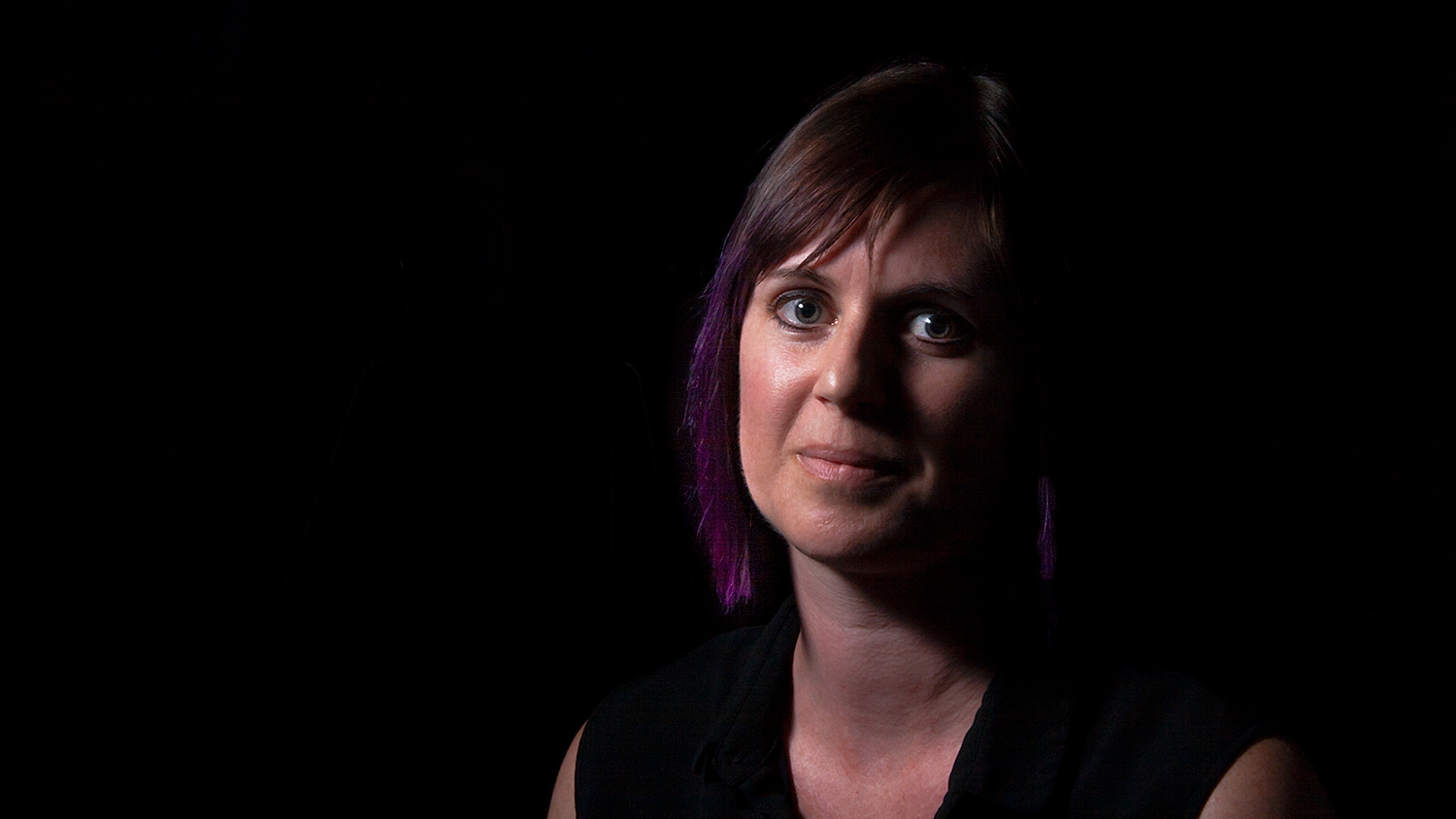
Yeah… I was raised in Grass Valley, [CA]. I hated it when I was kid. [Everyone laughs]
Well… when I was really little, I loved it, because I'm like, “Yay, let's go play outside!” It's a fairly rural area. It's a little more built up now than it used to be, but it's still fairly rural. And, we had a couple of acres and some bushes to play in, trees to climb. You know, things like that. Then when I got to be a teenager, I’m like, “This town is boring! Everything is terrible!” Now when I go back and visit though… like, man… if I could work there, I might. It's beautiful. It's quiet. Spend all summer at the river… You know, since I’ve left, I lived in San Francisco for a while, and then I've been living in deserts ever since. I miss the mountains. I miss the pine trees and the water.
Did you explore the mountains and engage with nature?
My dad was super into geology growing up—really into it—so we did a lot of hiking and stuff like that in the mountains. I basically grew up in the Sierra Nevada mountains. Camping was a big, big part of our childhood. Yeah… we did a lot of camping.
“We” as in you and your parents, or do you have siblings?
I have five older siblings. I don't know how my parents did it, honestly, because it's quite a handful. Although, I mean, to some extent, the older kids can help sort of wrangle the younger kids. It's still a lot of voices and a lot of opinions.
That must have been influential being surrounded by multiple voices and opinions, growing up. Do you think that shaped your thought process and approach to science?
Yeah, having that many kids who all think about and see the world in a different way—it definitely had an influence on the way that we grew up. I have been interested in science for a while. My sister ended up doing an art degree. My other sister did sociology. Some of my brothers were sort of more technical too. And so everybody had a different thing that they were interested in. My Dad was a philosophy major and my mom has an English degree…. so, just all these different perspectives. And they really did encourage us, as kids, to explore that. We would sit around the dinner table and start talking about one thing, and the conversation would morph into a conversation about something else, or the relationship between those two things: what's the relationship between science and society? And they never gave us topics or discussion questions, but we found that it would naturally just happen. And everybody wanted to be heard, and to discuss, so the conversations would be sometimes very long. My mom called them Kitchen Documentaries. [Everyone laughs] We'd sit around the dinner table, and we'd have these kitchen documentaries where we just kind of go off in these conversations about different things. So, I mean, I think that for me—I can't speak for my siblings—but for me, that definitely had a big impact on the way that I thought about thinking.
That sounds amazing. I imagine that environment also developed and influenced your creativity and artistic pursuits.
Yeah, I mean we did plenty of arts and crafts, like typical kids would do: popsicle sticks, tempera paint… you know, things like that. I think also, we were encouraged to use our environment a lot, and so we didn't necessarily have a “dollhouse,” but we could make a dollhouse out of a cardboard box and some sticks, you know. My dad is a carpenter, so I remember making little boats and floating them in the little irrigation ditch above our house. [Laughter] And so, I think there are some things like that for sure. I also, when I was in middle school, I participated in a program called Odyssey of the Mind.
Odyssey of the Mind?
Yeah. It's a really cool program that has both artistic performance and writing aspects to it, and improv; but you also have to build your sets—there are engineering challenges. So, you get together in a team of kids, and you're given a prompt, and the prompt has some sort of story, and you write a 10-minute play. And [the prompt] will say: you have to include these objects, and you have to overcome this obstacle, and you have to achieve X, Y, and Z in your whole performance. And adults aren't allowed to help, so the kids do everything. And at my school, we had this [thing] we called “The Pit.” And it was just a room full of random stuff that nobody wanted. And we’re like, “Well, I need to make a tutu, so what can I make a tutu out of? Oh look! I can make it out of, you know… whatever I find!” So I think that probably contributed (at least early on) to sort of the creativity and the idea of re-purposing items for new and fun, if trivial, uses.
Like re-purposing your thesis.
Yeah.
In your department, there is a tradition of burning one’s thesis after defense, but you chose to recreate it or ‘re-purpose’ it into a work of art. How did you arrive at that choice?
Well, I was getting ready to defend my thesis and I thought, 'I just spent the last six years building this thing and I wish that other people could see it for the accomplishment and the inspiring thing that I see it as, even though no one's going to read it 'cause it's a PhD thesis. [Everyone laughs] So yeah, I just felt like it would be a shame, really, to destroy it, even figuratively. And I just wanted to do something more creative with it.
I can pull it out if you want to see it.
Yeah. That would be great!
[Jamie walks out of the room for a moment, then returns carrying a large, wooden, book-shaped box. She sets it on the table in front of us, opens the lid, removes a protective sheet of vellum, and reveals her 150-page thesis. Her thesis is covered in what appears to be impact craters, revealing layers upon layers of pages—hints of color allude to figures and illustrations. We hover over her thesis.]
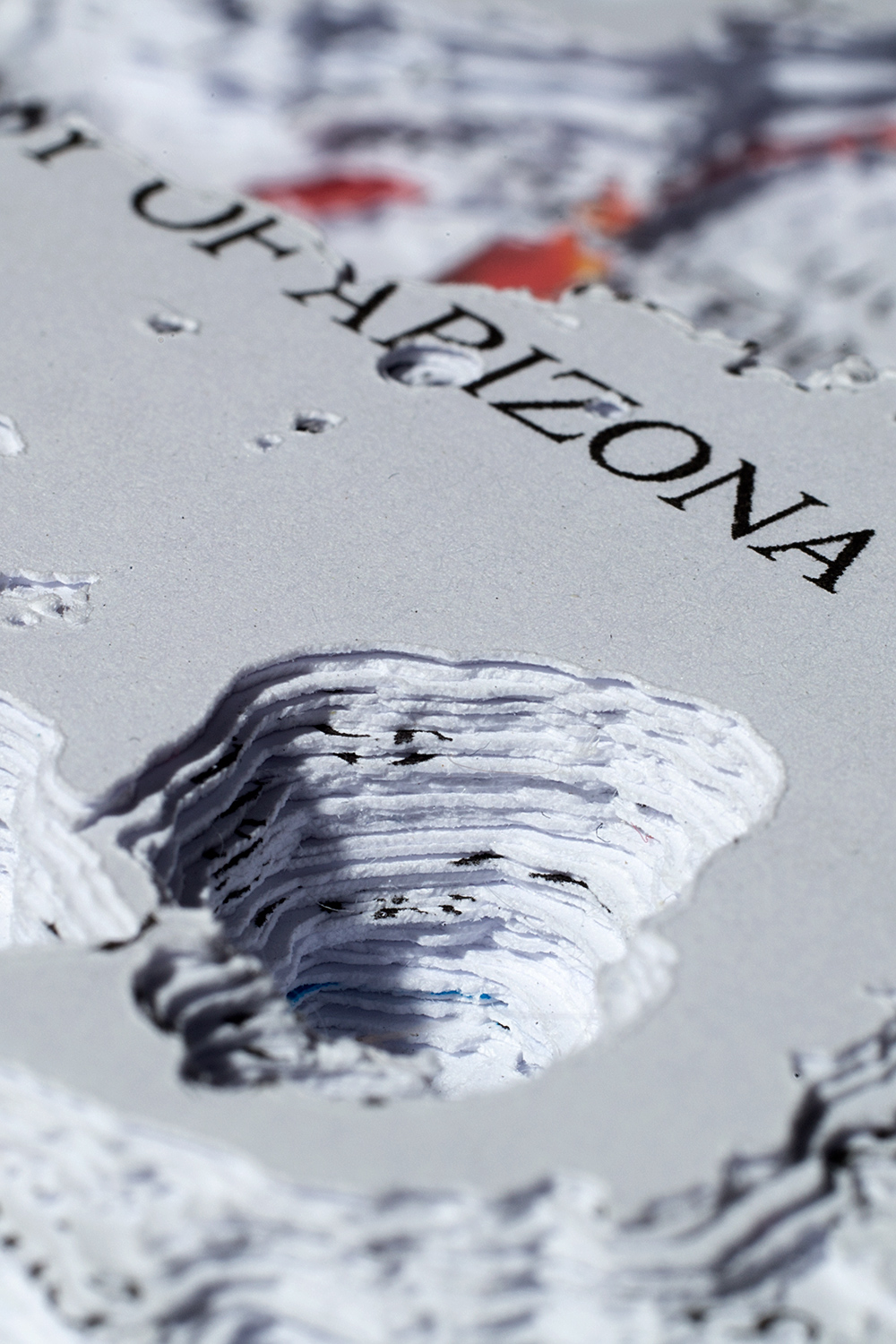
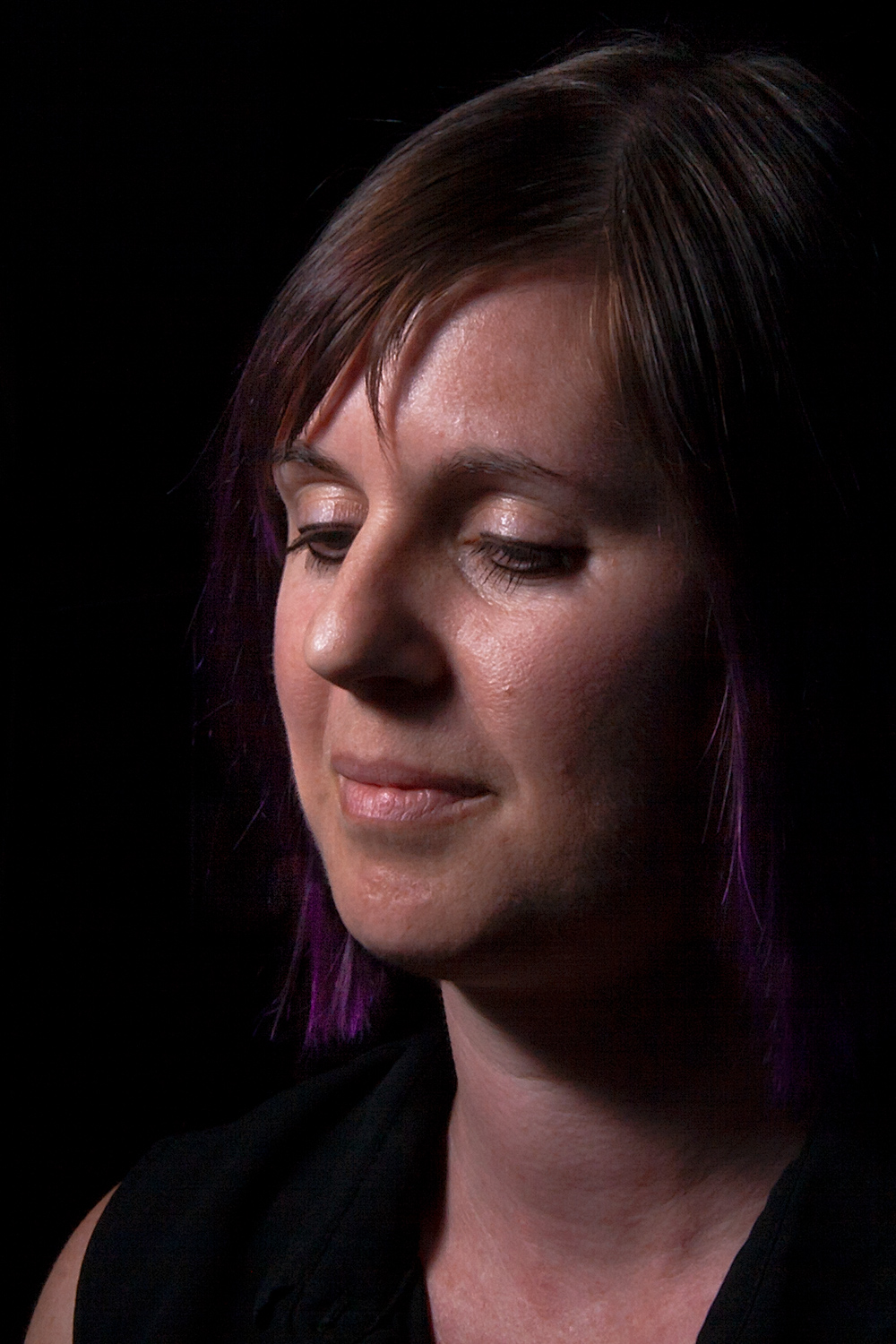
Could you tell us about the process and ideas behind it?
Yeah. So, the topography that's carved into it is from the LRO (the lunar reconnaissance orbiter) that's orbiting the moon. It has an altimeter on board, which is an instrument that measures topography. And so I took the altimeter data and wrote a program to process the data and slice it up into a bunch of contours, essentially. And then, I have a robot that will cut or draw in two dimensions, so I basically put each page through the robot to cut out each contour—it took a really long time. [Everyone laughs] I didn't do the cutting myself. [More laughter] These top pages took like 15 or 20 minutes to cut, a piece. And they're very delicate, so you have to be very careful when you're handling them and removing them—taking them in and out of the machine. It took a while to get the process down. Writing the code actually took the most amount of time—figuring out how to process the data.
So, there is a month of time between when you have to turn in your thesis to when you defend in my department. And I basically spent the whole month just cutting out pages. [Laughter] I was like, “I don't want to be stressed out about the fact that I'm defending and this is the culmination of my life's work, so I'm just going to cut these things out of paper and that's going to make me feel better about everything.” I mean, I think that's ultimately why I like doing creative things.
[Jamie gently closes the lid on her cratered thesis and moves it aside.]
I hate saying it this way because it doesn't mean what everybody thinks it means, but those things use a different part of the brain. It's a different kind of thought process that I use to do something creative in this way, than I am doing science creatively. And I don't want to suggest that science is not creative, because science is creative. It takes an enormous amount of imagination and creativity to create knowledge. As much as we like to think of it as being this objective thing, where information just tells us what it wants us to know, that's not really the way it works. We have to interpret data. And interpreting data—or even creating the data that we're interpreting—that whole process is exploratory. We're exploring information and trying to tease out different nuanced meanings. And that has many layers, and many ways of looking at it, and many ways we can filter (figuratively speaking) that information. And I think of that process as very similar to the way that people might create art—that we're exploring. The subject matter might be different, but we're both exploring information from different perspectives, and along different layers, or along different themes, in order to really create something.
Is there a particular moment in your life where you realized that you were creatively inclined towards science?
Not an individual moment—maybe a time. I was always interested in learning. I liked school. I liked math. But, I had never really considered doing that as a thing, as a career, until high school. I had a really fantastic physics teacher and I got really excited about physics. I'd never learned any [physics] before, and I just kind of ran away with it. And I got a job at our local kids’ science museum being a docent. So it really wasn't until then that I started getting interested in it, and seriously considering that that might be something I want to do. As opposed to some other people, who maybe knew from a much younger age that they wanted to do it, or wanted to be an astronaut, or something like that.
You didn’t want to be astronaut?
No, I figure I'll be an astronaut when we have Star Trek ships, and artificial gravity, and replicators. I'm all about comfort and safety. [Laughter] Comfort and safety is pretty great. [Everyone laughs]
What was it like being a docent? How old were you?
Fifteen, I guess? I think at that time, sort of discovering this new interest in science… it was empowering as a young person, to feel like I could then teach those kinds of concepts to other people. And, the woman who ran the museum—it shut down a few years ago, unfortunately; but the woman who ran the museum... I still think of her as a mentor. I go visit her every time I go home. So, it was a very nurturing environment for sure. I think sharing with other people and being able to lead them, and teach them, was a valuable experience at that age.
And this all inevitably led you to pursue physics as an undergrad. Is that where you discovered planetary science, while pursuing physics?
I hadn't even heard of planetary science until I pretty much finished undergrad. And, I had planned on going into particle physics, because I do like the weird, abstract theory stuff. But it turns out that the way you do that kind of science, and the environments in which you do that kind of science are very different, and those were less appealing to me. So when I found out about planetary science, I was like, “Oh! Well, here's this whole set of inspiring, interesting objects that I can use these tools to study. Maybe go outside once in awhile, instead of being stuck at a computer that's just making histograms of something,” you know?
Was there something in particular that sparked your interest in planetary science?
Yeah. So at the end of undergrad, I did this week-long internship through NASA Ames in the bay area. And, the purpose of the program was to take people interested—either actively doing so or interested in teaching science—and bring them out into the field with scientists doing research, to give them exposure to what it's like to really do research, and to be in a situation where you need to problem solve, so they can apply those lessons in the classroom to help kids of various ages learn. So I had done this week-long internship and I was like, “Wow!” I just… I liked being outside. [Laughter] So I was like, “You know… I could sit in a dark room, or maybe I could do fieldwork.” Of course now, I don't do hardly any fieldwork. [Everyone laughs]
It was an aspiration...
... It was an aspiration and it was really fun and it was just totally new. I had planned on taking a year off between undergrad and grad school while I was applying, but I basically emailed Chris McKay, one of the scientists I had met [during] the internship, and was like, “So… I was going to take a year off… is there maybe a project or something that I could do, even if you’re not paying me, or anything like that?” And he basically hired me for a year to do research with him.
Before even going to graduate school?
Before going to graduate school, yeah. And it was a really fantastic opportunity that he gave me. And you know, I learned, really, what doing science is like when you do a degree. You spend a lot of time learning the science part [in undergrad], but you don't spend a lot of time learning how to do science or how to do research. Like, I had never read a scientific paper at that point, you know. So I started that with him and then just kind of switched and said, “All right! I’m going to grad school for planetary instead!”
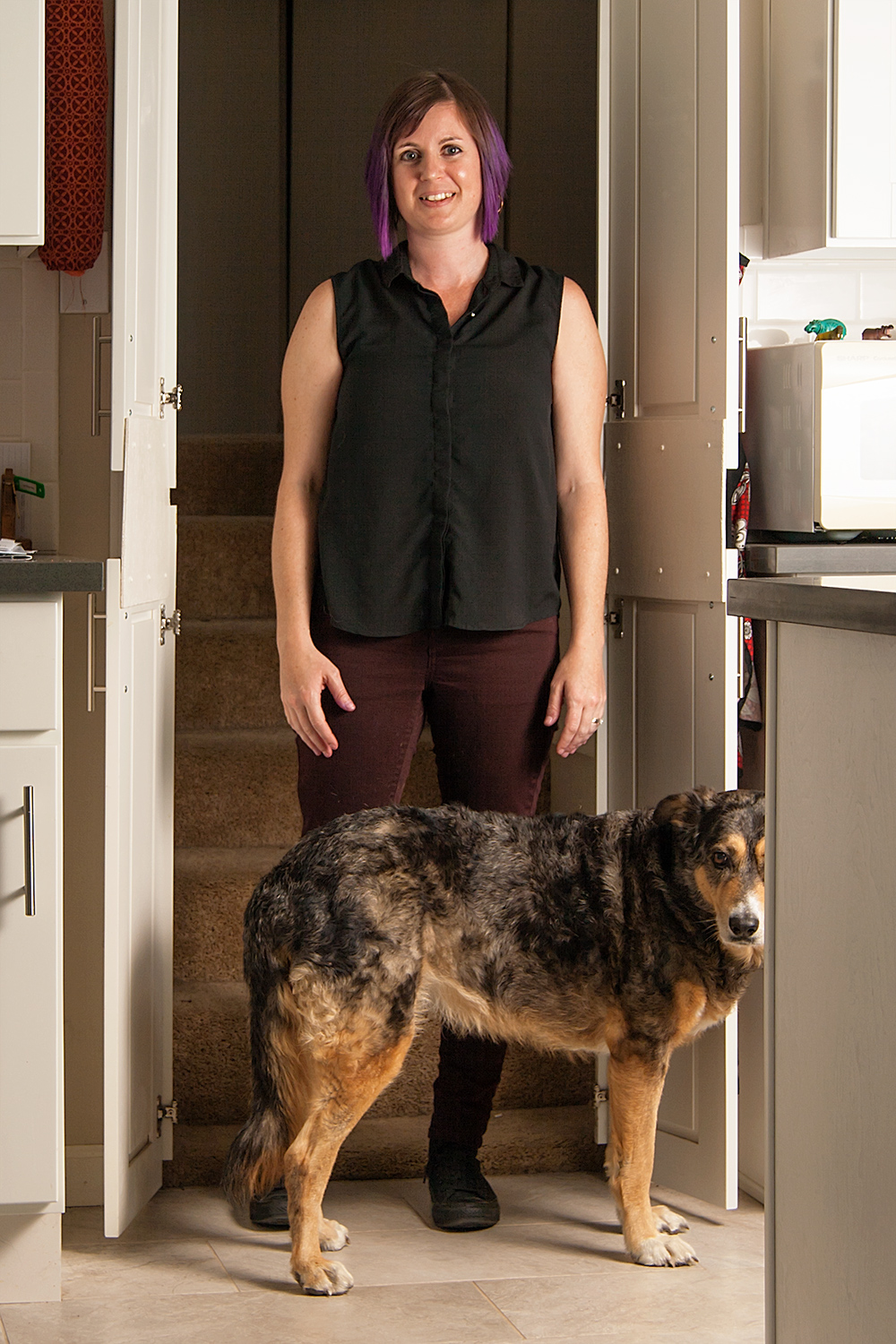
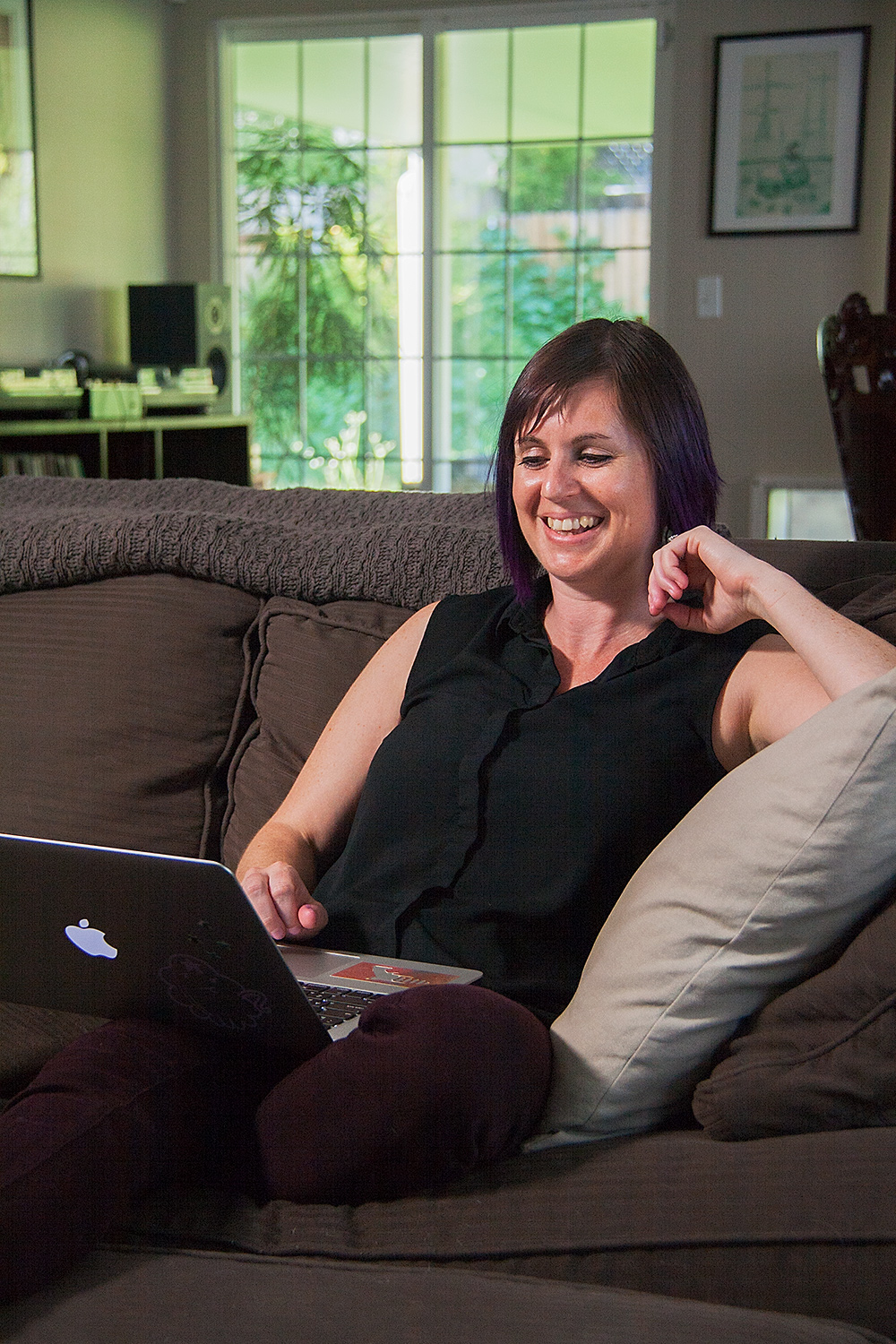
It’s inspiring to see that a series of choices over time influenced your path to planetary science. It’s also inspiring to find that in addition to a planetary scientist, you also choose to call yourself an artist and a feminist.
Yes.
Do you think feminism has influenced the way you conduct research or pursue science?
Interesting question. I don't know to what extent it's contributed to the techniques I use; but it definitely influences the way that I interact with the scientific community, for positive and negative reasons—you get the good and the bad with that. You know, the support network when something unfortunate happens, or when somebody makes a casual, sexist comment. But at the same time, there's this extra sense of community that I have with the women that I look up to in the field that I am able to go to for advice and support on science or nonscientific topics. So, I think that there's a significant sociological influence there. I don't know if I feel like it has affected the research itself, other than perhaps, I may not have done some of the projects I did if I hadn't connected with those women.
And I think also, I don't know what other women's experiences are, but when I was a younger woman (you know, early twenties and undergrad), I was much less aware of gender issues, and other kinds of issues—minority issues in society. I was much less aware and so I feel like I really came into that knowledge and that experience while developing my professional career. It's kind of a chicken-and-the-egg. Part of that's because I was exposed to women who were speaking about things like this, and sharing their experiences, and helping out the younger women in the field; but part of it was just an age thing.
Have you met any resistance to having “feminist” proclaimed on Twitter and your website?
Other than like men generally being dismissive? [Laughter] Yeah. And, I mean...
… I imagine that proclamation may threaten some people.
Yeah. And it does. And those are people you block on Twitter. [Everyone laughs] At least up ‘till now, it hasn't been as bad for me as it has been for other women I know on Twitter—that’s the nature of the Internet.
It’s a confident statement, isn’t it? So, what influences you to state it? If Jamie is the title, then feminist is your subtitle…
…Yeah. No, yeah. I totally understand that. And it is a statement, for sure. So, I do have a certain amount of confidence; part of it is my personality, and part of it is that I feel grateful for and thankful for the example that other women have shown me—how I can be empowered to speak up, and to ask for change, and where to go for support if that backfires. But beyond that, I think it’s important to recognize that while I'm negatively affected by sexism that exists in our society and in our field, there are other structures that I benefit from due to the fact that I'm white, and able-bodied, my sexual orientation, and gender identity—that's not a very articulate way of saying that, but all those structures that other marginalized groups are negatively affected by, I actually benefit from. And so in some sense, I feel like I need to recognize the fact that I do have a certain amount of privilege, and if I have the ability to speak up and ask for change, then I feel like I should. And sometimes that means me speaking out. Sometimes it might mean getting out of the way and helping to amplify the voice of another person. It could mean both of those things. And so in that context, we can only make the field better by demanding that change. And if I have the ability to affect some of that, then I'm happy to take that up. I may be less negatively affected by the consequences, and that is an important point. That the reason why other women may not speak out when they would like to is that they might fear the repercussions whether they're physical- or emotional- or career-related repercussions. So we do what we can in the confines of maintaining that level of safety.
Do you see the field becoming more inclusive? Are we on a single- or multiple-generation path?
It's hard to say. I mean... I think that the field is becoming more inclusive in general, but it doesn't change the fact that there are still systemic structures in the field in the way that research works, in the way that getting jobs and promotions work, in the way that getting into college and getting into graduate school works, that are still selecting out various groups of people. And I think it will take... even though the field is becoming more aware of those things, I think it will still take awhile to really dismantle those [structures], because it's going to take a lot of work. It takes a lot more than just awareness, and like somebody checking a box saying they took a racial bias sensitivity test or something. So, I don't know… it might take multiple generations of scientists. I don't think it'll be one.
And, I've only been out of grad school a few years, but the incoming grad students are already grasping these ideas, for these changes that women long before me have been pushing in the field. And they're coming in and saying, “Of course it should be that way,” you know. So we are seeing that change. It's just that it takes time for it to happen.
You founded The Art of Planetary Science exhibition at the University of Arizona to “celebrate the beauty of science.” What was the impetus behind it?
We started the art show partly because we felt like it was really important to show that science itself is beautiful, and the process of doing science is beautiful, but that it's something other people don't see. One of the examples I always give is a figure in a paper. When I make a plot for a scientific paper, it's beautiful to me because it has meaning, and it has context, and it has implications for the way I see the world. But a layperson doesn't see that. They [may] just see, “Oh, this is math. This is science. This is something that smart people do. It's not something that regular people do.” They [may not] feel connected to it—they [may] feel like it's beyond them. And that was really the impetus behind starting the art show in the first place.
So often, scientific concepts are just larger than life, so democratizing participation in visualizing a process, on any level, is very important.
Yeah, I mean, that makes me think of one of the things that we did during one of our art shows, working with an art class on campus. We made these big grids on poster board, and printed a visualization of a physics equation. When you look at [the equation] on a plot, it just looks like lines or whatever, but it's saying something interesting about the way something is moving. So we cut up the image into tiny little squares and we had different people color parts of the square and then put them all together into a kind of a collage. And it's a very, very small thing, but it was a way for people to feel like they could participate in interpreting that equation. I think things like that are really meaningful—it provides a way for people to form a meaningful connection to science in a way that they couldn't necessarily do before. So any kind of activity, or piece of art, or a process, or anything that we can really share, that seems intangible, or just out of reach, I think is a really positive and constructive thing for society. So any way we can bring people into engaging with [science] is important—or, at least not be afraid of it, or mistrust it; which now, more than ever, is important.
Jamie Louise Molaro is currently a Research Scientist for the Planetary Science Institute (PSI), and a Research Affiliate for the National Aeronautics and Space Administration-Jet Propulsion Laboroatory (NASA-JPL) in Pasadena, California. Jamie was previously a Postdoctoral Fellow at NASA-JPL. Jamie holds a Doctor of Philosphy and Master of Science degree in planetary science from University of Arizona, Tuscon, and a Bachelor of Science degree in physics from San Francisco State University, California.